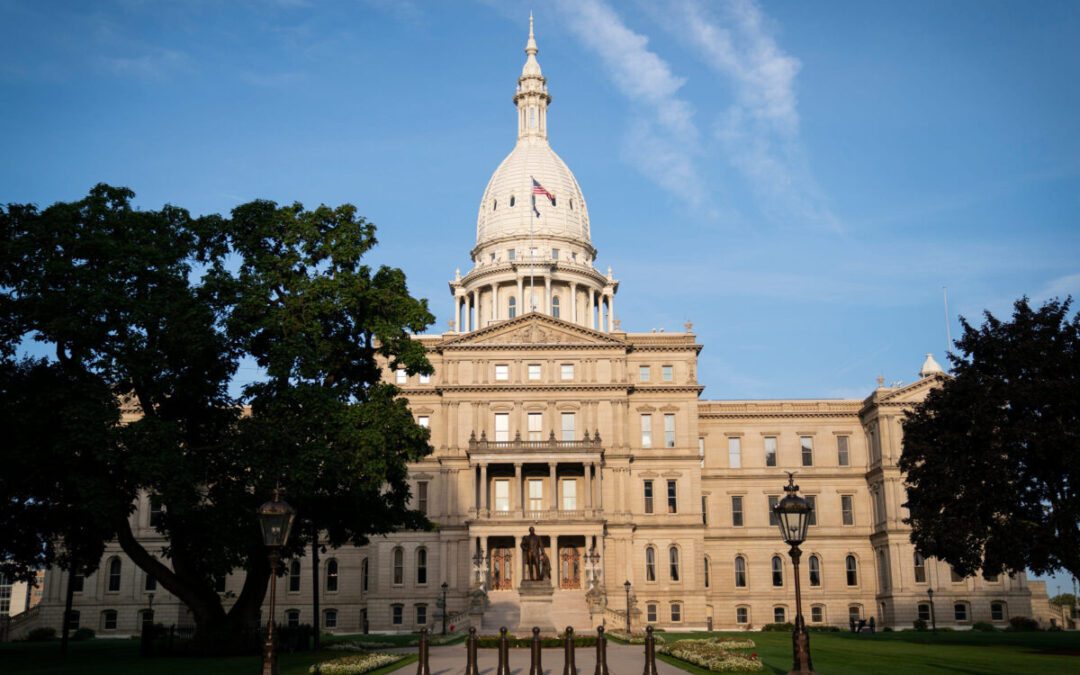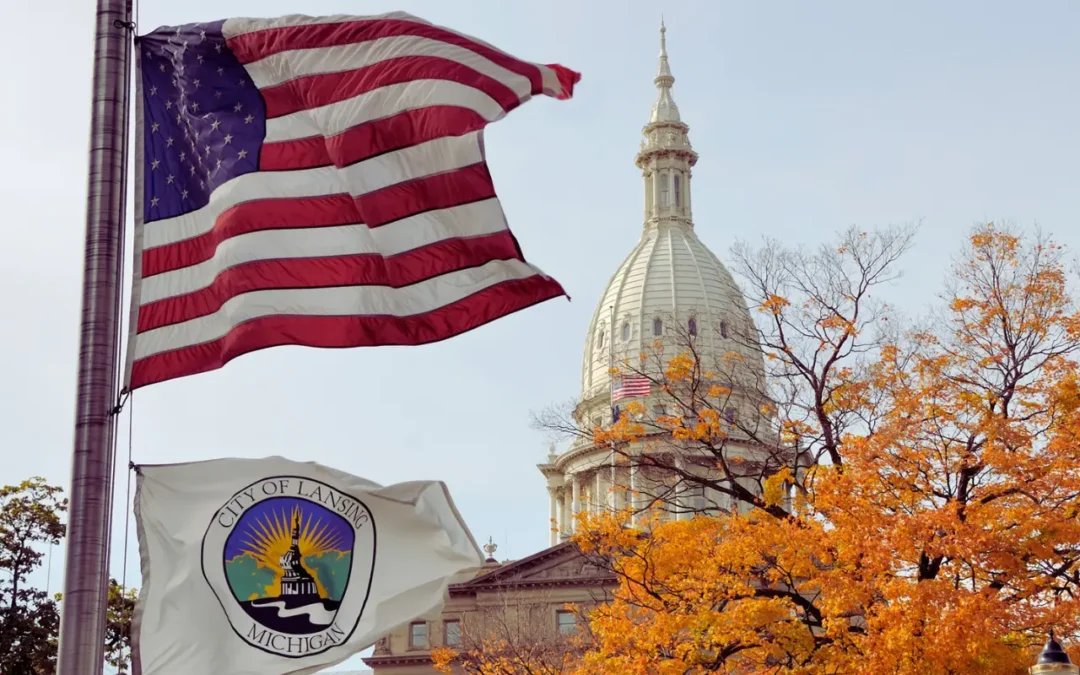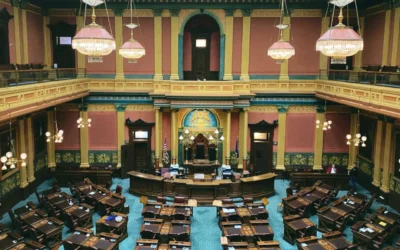
Paul Weaver/SOPA Images/LightRocket via Getty Images
LANSING—Community leaders are calling on Democratic state lawmakers to use their final weeks in full control of this year’s legislative session to put an end to the so-called “Dark Store” tax theory that large retailers across Michigan have used to lower their property taxes.
School and library officials this week joined state Reps. Julie Brixie (D-Meridian Township) and Jenn Hill (D-Marquette) for a virtual press conference to shed light on the “Big Box tax loophole” in Michigan, as well as urge lawmakers to pass House Bills 5865, 5866, 5867, and 5868.
The package of bills—which was introduced by Brixie and Hill in June—would amend state laws to effectively limit large retailers’ ability to petition the state for significant property tax cuts.
And by keeping corporations on the hook for their “fair share,” the bills will ultimately protect billions of dollars in tax revenue for schools, libraries, and other services, lawmakers said.
“Our local services are threadbare and we have to use every possible penny and dime in the cushions that we can find to actually provide basic levels of service,” Hill told The ‘Gander during a press conference on Wednesday afternoon. “And we’re trying to make that stop.”
What’s the Dark Store Theory?
The “Dark Store Theory” is a moniker used to describe an argument that large corporate retailers often use to justify a reduction in their property taxes, namely by claiming their stores are “functionally obsolete” and appealing their state tax rate to the Michigan Tax Tribunal.
By taking advantage of the so-called “loophole” in state law, hundreds of wealthy corporations have been able to lower their taxable value by millions of dollars—even for brand new stores.
“Using this theory, a big box store like Costco or Menards could build a $20 million brand new investment in a community that ends up being taxed the same as a shuttered Kmart and pays less per square foot in taxes than every small mom and pop shop around the state,” Brixie said.
Brixie also estimated that “every single” major retailer in Michigan has used the tactic.
What’s the problem?
Lawmakers said it’s difficult to estimate the full extent of the “problem,” but they estimate the legal maneuvering has resulted in about $2 billion in lost tax revenue annually for hundreds of communities—with smaller, rural communities often facing the biggest budget cuts as a result.
“Retailers all over Michigan are using this loophole to avoid paying billions of dollars in property taxes that directly support our schools, local communities and the services that we rely on every day,” Brixie said this week. “What we know for certain is that in every community where Big Box stores exist, we can point to a school or district library or community or other valued public institution that has been made to pick up the bill when a big box store shirks their responsibility.”
Shane Peters, superintendent at Bridgeman Public Schools, said the corporate tax reduction structure has resulted in annual tax revenue losses of up to $1.8 million for his district alone.
“It will impact our administrators, our teachers, our programming, athletics, curriculum, transportation,” Peters said. “That’s a loss to our children and our families in this community. … Students will suffer when these companies continue to exploit these tax loopholes.”
Deb Mikula, executive director of the Michigan Association of Libraries, also said the Dark Store Theory has impacted nearly every public library across the state “in some way, shape or form,” and specifically recounted how one Upper Peninsula library was forced to close on Sundays after a nearby Lowes store successfully appealed for a tax reduction of nearly $1 million.
“With the sharp cuts to funding due to the Dark Store tax appeals, that public library simply can’t provide the same level of exceptional services and that will result in dwindling returns for the taxpayers,” Mikula said. “There are many more [similar examples] across the state of Michigan.”
Lawmakers also pointed to billions of dollars in recent corporate tax cuts that could’ve instead expanded staffing at police and fire departments, as well as supported other public services.
“This is a really unfair tax evasion strategy,” Brixie said at the press conference. “Brand new big box stores do not have the same value as vacant stores—nor are they functionally obsolete.”
What’s the plan?
State lawmakers have reportedly grappled with plans to close the so-called loophole for years—including as early as 2020 when state Sen. Ed McBroom (R-Vulcan) pitched state legislation to formally change the way property taxes are assessed on large retail stores.
Those bills died in a state Senate committee, but Brixie, Hill and state Reps. Mai Xiong (D-Warren) and Greg Markkanen (R-Hancock) are now leading the charge on a new set of bills they hope will resolve the issue once and for all—maybe even as soon as next year.
“We’ve introduced a bipartisan bill package to stop these wealthy corporations from taking advantage of our citizens through this tax loophole,” Hill said at this week’s press conference.
Specifically, House Bills 5865-5868 would prohibit retailers from using vacant, deed-restricted stores as comparables for property tax evaluations. They would also require stores to provide appraisals with their appeals, as well as set new state standards for determining their property tax obligations that would align more closely with the appraised value of the building and land.
And by closing off an avenue for wealthy corporations to avoid paying property taxes, lawmakers hope the legislation will go on to boost local tax revenue statewide—ultimately benefiting all Michiganders by maintaining and improving the public services and infrastructure.
“The public revenue losses have devastated local services,” Hill said in a press release announcing the package of legislation this summer. “Our legislation will ensure big-box retailers pay their fair share of property taxes, just like every other business and homeowner.”
Other states like Wisconsin and Maine have taken action to close similar tax loopholes, but all prior attempts to pass reforms in Michigan have been stalled by corporate opposition and other organizations with “deep pockets” exerting their influence over state lawmakers, Brixie said.
With Democrats in majority control of the state Legislature for a few more weeks until more conservative Republicans take charge of the state House in January, Brixie said the clock is ticking to get the bills passed. She expects the House Committee on Tax Policy to hold a formal hearing to advance the legislation to the full House floor during the first few weeks of December.
“I know that there are a lot of people in my caucus who have been extremely concerned about this,” Brixie told The ‘Gander. “The school communities are completely behind us. We have the support of so many groups. … Some pretty important stakeholders are supporting this [legislation] and asking the Legislature to resolve the issue and to close the loophole.”
READ MORE: Michigan Dem pitches bill to hike corporate taxes and support schools
For the latest Michigan news, follow The ‘Gander on Twitter.
Follow Political Correspondent Kyle Kaminski here.
Support Our Cause
Thank you for taking the time to read our work. Before you go, we hope you'll consider supporting our values-driven journalism, which has always strived to make clear what's really at stake for Michiganders and our future.
Since day one, our goal here at The 'Gander has always been to empower people across the state with fact-based news and information. We believe that when people are armed with knowledge about what's happening in their local, state, and federal governments—including who is working on their behalf and who is actively trying to block efforts aimed at improving the daily lives of Michigan families—they will be inspired to become civically engaged.


Michigan OKs landmark regulations that push up-front costs to data centers
Michigan regulators on Thursday adopted landmark standards for the booming data center industry with a plan they say tries to protect residents from...

Q&A: Why this 29-year-old Detroiter thinks he can make Michigan government work again
Democratic state Senate candidate Justin Onwenu says he wants to rebuild trust, invest in neighborhoods, and help deliver a new generation of...

Michigan state budget 2026: 7 things to know about the bills
LANSING — Lawmakers on Oct. 2 and Oct. 3 voted to approve a 2026 budget plan that makes cuts to many state agencies while boosting funding...

Michigan Legislature passes eight day continuation budget, votes expected Thursday
BY BEN SOLIS AND KYLE DAVIDSON, MICHIGAN ADVANCE LANSING—In the thick of a government shutdown that lasted just one hour, the Michigan House and...

Michigan budget crisis averted: Legislature, Whitmer announce deal days before shutdown
BY BEN SOLIS, MICHIGAN ADVANCE LANSING—The respective leaders of the Michigan Legislature and Gov. Gretchen Whitmer on Thursday evening announced...





